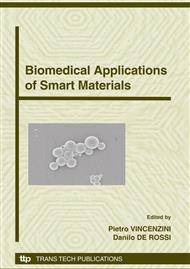p.188
p.195
p.204
p.210
p.216
p.220
p.226
p.235
p.241
Estimate Biocompatibility and Injection-Molding Processability of Ti-Based Metallic Glasses for Dental Implant
Abstract:
Recently, Ti-based metallic glasses aim at biomaterials with their high specific strength and superior corrosion resistance. Their high workability also shows a good performance for mass production under the energy saving environment. In this study, we started investigation of the design of Ti-based metallic glasses with the restricted alloying elements for biocompatibility and characteristic evaluation of the optimized Ti-based metallic glasses with higher glass forming ability for dental implants. These Ti-based metallic glasses do not contain Al, V and Ni elements which are well known to be neurotoxicity and cytotoxicity for human body. Current medical reports of impracticability by these elements have been a hot issue in biomaterials science. Newly designed Ti-based metallic glasses exhibit good performances. Especially, the optimized Ti-based metallic glass has high corrosion resistance with better passivity in a wide passivation range in simulated body fluids at 310K. In addition, biocompatibility of Ti-based metallic glass was also evaluated by cell culture in vitro. Excellent biocompatibility of Ti-based metallic glass show high potentials to be applied as biomaterials that necrosis of osteoblast (SaOS2) was not detected in this study.
Info:
Periodical:
Pages:
216-219
DOI:
Citation:
Online since:
September 2008
Authors:
Price:
Сopyright:
© 2008 Trans Tech Publications Ltd. All Rights Reserved
Share:
Citation:


